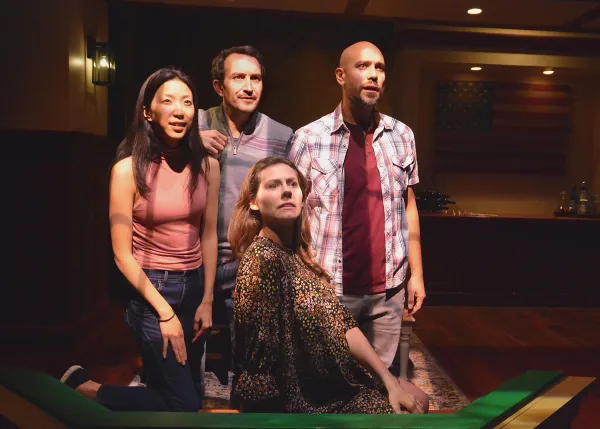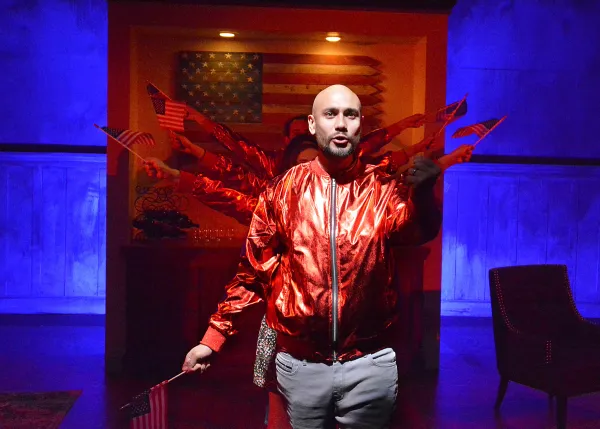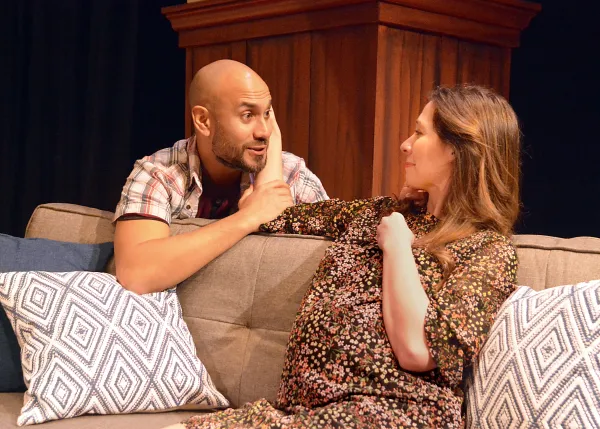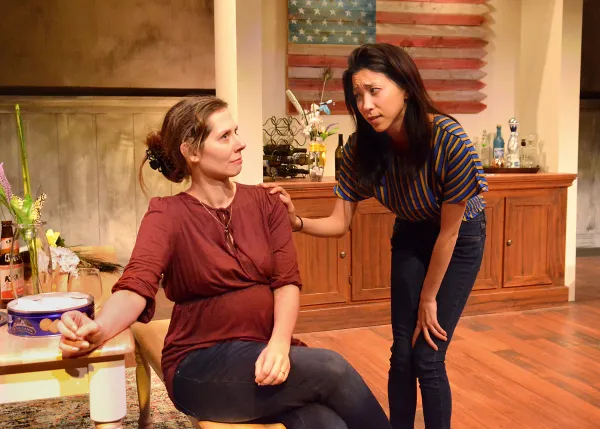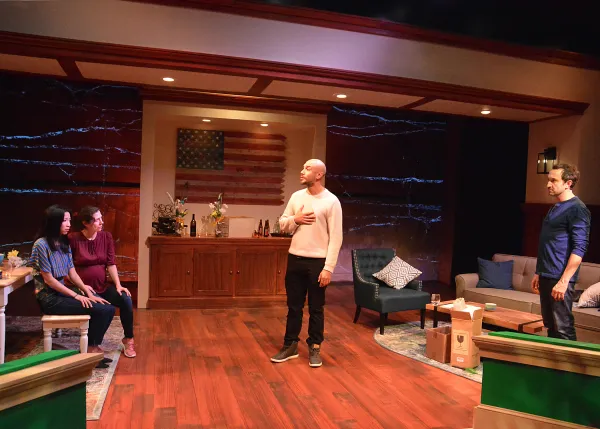Let me cut (and I mean “cut” in all its meanings) to the “race” - uh, I mean chase: Skylight
Theatre Company’s world premiere of playwright Penelope Lowder’s West Adams is a great new play. In about 90 minutes Adams features a searing, scorching look at timely issues in a highly entertaining way full of wit and drama, offering ticket buyers a powerful, wonderful night at the thee-a-tuh.
Lowder’s lowdown is ripped-from-the-headlines, dramatizing the hot button topic of gentrification in general, and in particular, at the titular West Adams, a historic Los Angeles neighborhood located south of what could be considered contemporary L.A.’s “Mason-Dixon Line,” aka the 10 Freeway. (The one-acter could use a bit more historical background for auds unfamiliar with the district.) In the late 19th century West Adams was a wealthy district full of Victorian mansions and Craftsman bungalows. Over the decades, once posh areas like Beverly Hills and the West Side were developed, what might be described as an early version of “white flight” began and the ethnic composition of the neighborhood changed. African American notables (likely barred from living in other L.A. residential areas due to apartheid-like zoning restrictions) moved into West Adams, including actor Hattie McDaniel, boxer Joe Louis, musicians Lionel Hampton, Ray Charles, Marvin Gaye and Little Richard.
Today West Adams is mostly populated by Blacks and Hispanics - enter two “upwardly mobile” couples into Lowder’s South Side story. The invaders are: Caucasian Michael (Clayton Farris) and Asian-American Julie (Jenny Soo, who according to the playbill earned a BFA at NYU and MFA at Harvard) plus the white, expecting Sarah (Allison Blaize) and Edward (Andrés M. Bagg), who is initially presented as being Latino and then more specifically as “Peruvian.”
This quartet of parvenu newbies is hell-bent on bending the quarter to fit their perceptions about the way things oughtta be, in the gentrification gospel according to them. The opening scene of West Adams seemed to be perfectly timed vis-à-vis the Super Bowl, just as the play’s Feb. 1 premiere is for “Black History Month.” The proverbial curtain lifts with the foursome performing a rousing rendition of a patriotic song that suggests a cross between Super Bowl cheerleaders and glitzy half-time entertainment.
However, their routine isn’t primarily intended to provide beholders with enjoyment but rather to insidiously insinuate themselves into the community they are infiltrating, in particular, by getting a place at the table via Michael’s election to the Neighborhood Council in order to impose their will. The newcomers are full of wiles and ulterior motives.
A tipoff to where the conniving quartet’s heads are at (clue: you could find out where with a colonoscopy) is Julie’s repeated boast West Adams is so grandiose that even “Mussolini” visited there - as if this is anything to be proud of.
[Here, the reviewer digresses to impress readers with his acumen as a film historian who has thoroughly researched arcane archives, such as Wikipedia. Prepare to be dazzled, o reader. Behold:]
(Although methinks it was actually the Italian dictator’s son Vittorio, not Benito himself, who ventured forth. It seems that a reception for Vittorio was held at the West Adams’ Beaux Arts/Italian Renaissance Revival palace constructed by winery owner Secundo Guasti, although it was producer Hal Roach who hosted Mussolini junior during his filmmaking-related 1937 trip to Hollywood. FYI, Vittorio’s visit was protested by the Hollywood Anti-Nazi League. According to an ad HANL placed in Tinseltown’s trade papers, Vittorio Mussolini “asked for–and received–the privilege of being the first fascist aviator to bomb helpless Ethiopians,” which - had it been included in the script - would organically fit into Adams’ anti-racist plot. In any case, HANL’s saga is a story waiting to be told on stage and/or screen.)
Meanwhile, back at the review:
Needless to say, the Machiavellian machinations of the intrepid interlopers sets them on a collision course with their largely Black and Hispanic neighbors. It is a conflict laden with racial and class overtones. The standout in the excellent ensemble, deftly directed by the celebrated Michael A. Shepperd of Celebration Theatre, is the slinky Soo, who in certain tops has, shall we say, points of interest. Her sensuous character may seem to be a trope referencing Asian women as “the flower of” femininity (as the deluded Julie puts it) - but as it turns out, Julie’s sexualization is not merely gratuitous. Indeed, it becomes an essential organic part of the plot, which as it evolves peels away the arriviste foursome’s pretentions to reveal some rather unpleasant-to-despicable truths regarding their finances, arson, murder, Christianity, marital fidelities (or lack of - say, inquiring minds want to know who really is the biological father of the baby Sarah is carrying in a belly that grows as the play progresses?), etc.
Perhaps most of all, realities about identity are disclosed. And while Americans tend to think of racism as primarily being a Black-white thang, Lowder tosses Latino heritage into the mix, too, along with exposing clashes between Asians and African Americans. Her one-act black comedy (no pun intended) closes referencing another patriotic song (sound design by Jesse Mandapat) and throws a racist chant by Charlottesville’s white nationalists back into their faces. According to press notes, Lowder calls her gentrifying characters “new colonials” who “seed the divide and fuel racism, ultimately destroying so many black and brown people."
Scenic designer Stephen Gifford’s set of the living room of a well-appointed West Adams home, complete with an American flag-like image reminiscent of Jasper Johns’ paintings, enhances the action, as do David Murakami’s projections.
African American notables attending the world premiere’s opening night included Charles Reese, who presents one-man shows celebrating author/activist James Baldwin; Clarence Williams (who, methinks, played Linc on the Mod Squad TV series); and but of course, Shepperd and Lowder, who was lauded before the curtain lifted by Skylight Theatre Company’s Artistic Director, Gary Grossman, for being the first bard of Skylight’s professional playwrights-in-residence laboratory cleverly entitled “Skylab” to have her brand new work produced at the Skylight, which Grossman has presided over for 37 years.
Rejoice: West Adams announces the arrival of a major voice dramatizing touchy topics like race and class (or the lack of) in an extremely enjoyable way. Rarely, if ever, during its 90-ish minutes does the witty, breezy West Adams sound like a screed, despite the fact that it boldly tackles hard-hitting subjects. The four characters of West Adams are not unlike the dramatis personae of The Addams Family, in that they, too, are macabre outsiders trying to deal with the majority other. At times, the play’s couples are similar to Morticia and Gomez. Like Charles Addams’ cartoons and the TV/movie iterations of The Addams Family, West Adams is likewise leavened with humor. The difference is that Lowder’s jokes may stick in your throat. West Adams’ clarion call is like Commissioner Gordon projecting the Bat Signal to alert Adam West as Batman about the danger of racism.
If the playwright can end her warning with a quote from neo-Nazis, please permit your humble scribe to close with a quotation from Black Panther Fred Hampton: “You don't fight racism with racism. We're gonna fight racism with SOLIDARITY!” Don’t miss West Adams, must- see theatre at its finest and most relevant.
Skylight Theatre Company presents the world premiere of West Adams at 8:00 p.m. on Thursdays, 8:30 p.m. on Fridays and Saturdays, and 3:00 p.m. on Sundays through November 24 at Skylight Theatre, 1816½ N. Vermont Ave., L.A., CA 90027. Tickets may be purchased online at:
http://www.SkylightTix.com or via phone at: (866) 811-4111; (213)761-7061. Penelope Lowder’s short movie 15 Minutes will be screened at L.A.’s Pan African Film Festival, taking place Feb. 11-23 (for info see:
https://www.paff.org/films/#!/film/15_minutes).
For those who value excellence and diversity on the stage, The Los Angeles Women's Theatre Festival’s 27th annual fête, focusing on multi-culti female solo performers, is taking place March 26 - 29 at Theatre 68, 5112 Lankershim Boulevard, North Hollywood, CA 91601. See: https://www.lawtf.org/.
Ed Rampell is an L.A.-based film historian/reviewer and co-author of “The Hawaii Movie and Television Book”. He recently won “media’s most coveted accolade” - see: https://better-lemons.com/the-better-lemons-fomenter-of-revolution-critic-award-for-2019-goes-to/.



